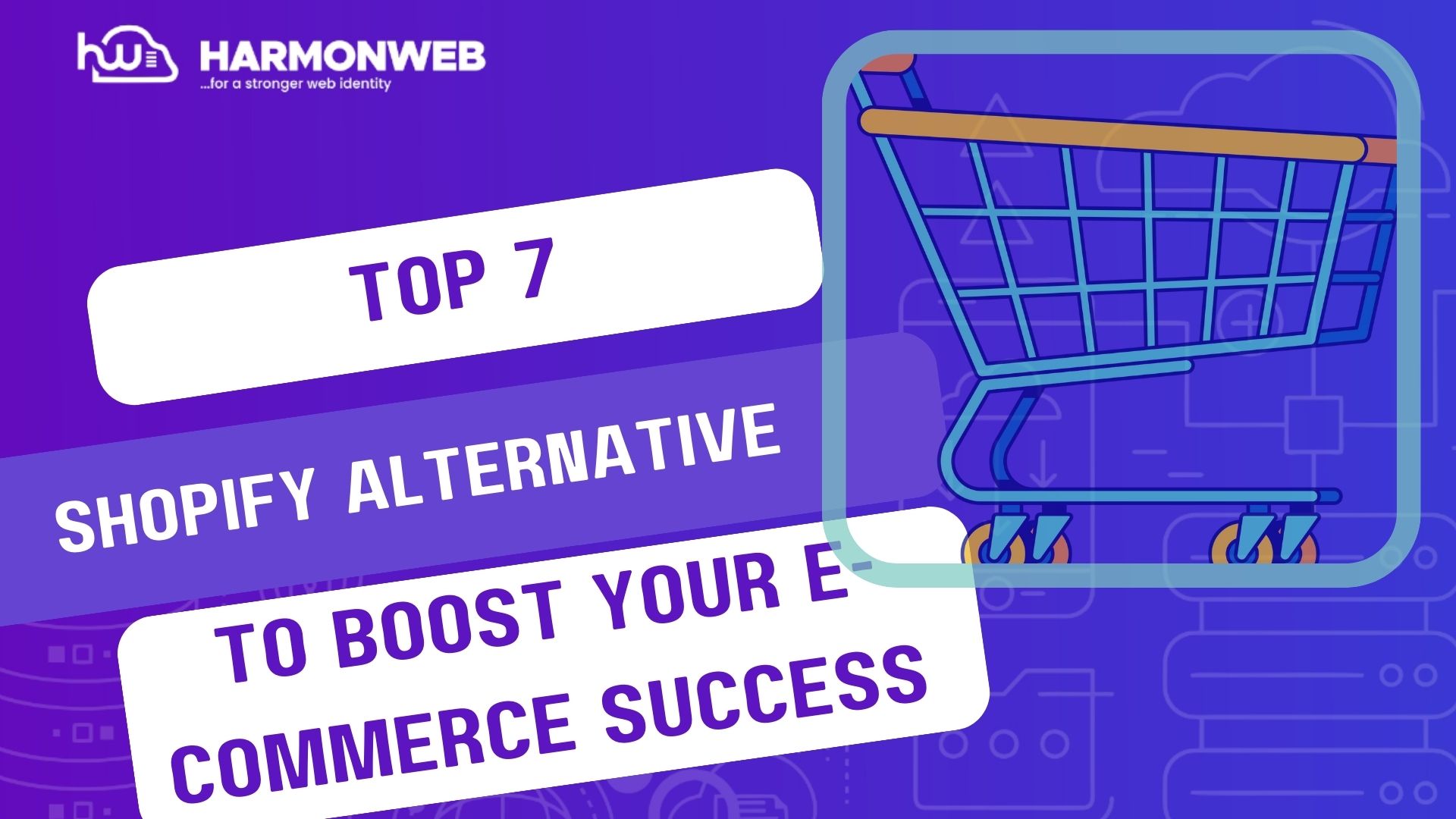If you are looking forward to building an ecommerce store in 2025, you might as well consider other alternatives other than the popular Shopify. Shopify is a powerful platform, but it might not be the best for what you have in mind. So it is best you consider other options that is a perfect fit for you, instead of seeing shopify as an all fit platforms for everyone.
In this article we will look at other options, especially when you are looking forward to carry out more customization, affordability or niche features that will cater perfectly for your needs.

Why Look For Shopify Alternatives?
As an entrepreneur, your ability to seek and leverage on the best of resources will greatly influence the trajectory of your entrepreneurial journey. While Shopify is a popular and robust ecommerce platform, it is not an all fit solution for every online store.
Let us look at some considerations every entrepreneur should consider before making this choice and seeking for alternatives:
1). Cost Concerns For Smaller Business:
As a small business owner, you may find the cost of running a shopify store expensive considering your lean budget. So it is advisable you keep your eyes peel for platforms whose payment are perfect for your pocket. Always remember that the entrepreneur first goal is profit as this would determine your longetivity and success in the business on the long run.
These cost concerns varies from the monthly subscription fees which comprises of basic plans, and advanced plans which is costlier but with additional features to support your growing business. To the transaction fees especially when you are not using the shopify payments and you are using a third party payment processor like Paypal, and stripe. Additionally you have to pay for apps and add-ons for various functionalities such as SEO tools, inventory management and email marketing, likewise premium themes that adds professionalism to your store. These payment are vital, but they are usually recurring payments.
2). Limited Customization:
If your plan is to carry out customizations to enable more flexibility and enhancement to your online store, then Shopify may come short of this. As it does not allow you to easily tweak the templates around for none developer.
It does not give you the flexibility to integrate third party tools to achieve that your high end results. I want you to note that both the templates and tools will originally cater to your needs, but when you have complex needs then shopify might come short of this goal.
3). Feature Restrictions:
Shopify may be a little stiff especially when you wish to explore advanced features to cater for your ever growing online store. And this may prevent you from scaling your business to your desire target.
Plus, you will have to bear with having limited control of your server, since Shopify manage the infrastructure for you.
The Best Shopify Alternatives For 2025
1). WooCommerce:
If you are looking for a platform that support seamless integration with WordPress, then WooCommerce is the best pick for you. It gives you the flexibility to customize with free or premium WordPress themes available at your disposal. You can as well seek to integrate third party plugins to have your desired functionality.
Key features:
•Seamless integration with WordPress
Flexible customization option with themes and plugins.
No transaction fees with the exception of payment gateway charges.
• Wide selection available for free and paid premium plugins to enhance your desired functionality.
Excellent SEO capabilities leveraging on WordPress vast infrastructure.
Best for: Businesses already using WordPress and seeking a flexible, budget-friendly option.
2). BigCommerce:
This is a SaaS based platform and a direct competitor to Shopify. It offers advanced tools that will cater to scaling your business in the long run. Plus it has no transaction fees on all of its plans and also support multiple sales channels like eBay and Amazon.
Key features:
• No transaction fees on any plan.
• Built-in SEO and marketing tools
Supports multiple sales channels, including Amazon and eBay.
Best For: Medium to large-scale businesses focused on growth.
3). Squarespace:
As a creative professional that will be exploring appealing visuals, squarespace will cater for this need as it has appealing design templates. It also has built-in blogging tools to support your blogging needs with portfolio features to build that standout portfolio for your creative work.
Key features:
• Visually appealing design templates
• Built-in blogging and portfolio features
• Affordable pricing for small businesses.
Best for: Creatives and small business owners prioritizing aesthetics.
4). Magento (Adobe Commerce):
Magento is a robust e-commerce platform that offers endless customization options for tech-savvy users. It is designed to support your business at enterprise level. And an open-source version for complete control and contribution by creative developers in the industry.
Key Features:
•Open-source version for complete control.
•Scalability for large enterprises.
Advanced analytics and marketing tools.
Best For: Large businesses with a dedicated tech team.
5). Wix eCommerce:
Wix is a beginner-friendly platform offering e-commerce features at a competitive price point. It enables you to customize your store with ease using its drag and drop website builder. You don’t have to be an expert to arrive at something awesome as they have AI-driven design suggestions that assist you along the way.
Key Features:
• Drag and drop website builder.
• Affordable pricing plans.
• AI-driven design suggestions.
Best For: Startups and small businesses with minimal technical expertise.
6). PrestaShop:
PrestaShop is an open-source platform that allows for significant customization without high costs. They support multi-language and multi-currency, so you can attend to your customers from all over the world.
Key Features:
• Free to download and use.
• Wide range of add-ons for enhanced functionality.
• Multi-language and multi-currency support.
Best For: Budget-conscious businesses targeting global markets.
7). Ecwid:
Ecwid allows you to add an e-commerce store to an existing website or social media page. So if you already have a website or social media page all you have to do is to integrate together instead of building up from scratch.
Key Features:
• Simple integration with any website.
• Affordable pricing tiers.
• Supports omnichannel setting.
Best For: Businesses that already have a website and need e-commerce capabilities.
How To Choose The Right Shopify Alternative
The best way to approach making the right decision on the best alternative to Shopify is to consider some of this factors below as they are vital to how successful you will be in the long run.
1). Budget:
When considering alternatives to Shopify, budget is a crucial factor to keep in mind. Shopify’s pricing plans can be steep for small businesses or startups, and exploring alternative e-commerce platforms can help reduce costs. Different platforms offer varying pricing models, including free plans, subscription-based models, and transaction-based fees. Understanding your budget constraints will help you narrow down options and choose a platform that aligns with your financial resources.
Considering your budget when choosing an alternative to Shopify also involves thinking about additional costs beyond the platform’s subscription fee. These may include payment processing fees, third-party app integrations, and custom development costs. By evaluating these extra expenses, you can get a clearer picture of the total cost of ownership for each platform. This will enable you to make an informed decision that balances your e-commerce needs with your financial limitations, ensuring a sustainable and profitable online business.
2). Ease of Use:
When exploring alternatives to Shopify, ease of use is a vital consideration to ensure a seamless transition and efficient management of your online store. A user-friendly platform can save you time and reduce frustration, allowing you to focus on growing your business. If you are not tech-savvy, a platform with a steep learning curve can be overwhelming, leading to delays and lost sales. By choosing a platform with an intuitive interface, you can quickly set up and manage your store, even if you have limited technical expertise.
Considering ease of use also involves thinking about the day-to-day tasks you’ll perform on the platform, such as product management, order fulfillment, and customer support. A platform that streamlines these processes can significantly improve your productivity and overall experience. Additionally, if you plan to delegate tasks to team members or hire staff, a user-friendly platform can reduce training time and ensure that everyone can use the platform effectively. By prioritizing ease of use, you can choose a platform that supports your business goals and makes managing your online store a breeze.
3). Scalability:
When evaluating alternatives to Shopify, scalability is a critical factor to consider, as it directly impacts your online store’s ability to grow and adapt to changing demands. A scalable platform ensures that your store can handle increased traffic, sales, and product offerings without compromising performance or reliability. If your platform can’t scale with your business, you may experience downtime, slow loading times, or other issues that can harm your reputation and bottom line. By choosing a scalable platform, you can confidently expand your product lines, marketing efforts, and customer base.
Considering scalability also involves thinking about the platform’s architecture, infrastructure, and flexibility. Can the platform handle sudden spikes in traffic or sales? Does it offer flexible pricing plans that adjust to your growing needs? Can you easily integrate third-party apps or services to extend the platform’s functionality? By evaluating these factors, you can determine whether a platform can support your long-term growth ambitions and adapt to the ever-changing e-commerce landscape. A scalable platform provides peace of mind, allowing you to focus on driving business growth rather than worrying about infrastructure limitations.
4). Customization:
When exploring alternatives to Shopify, customization is a crucial aspect to consider, as it enables you to tailor your online store to your unique brand identity and business needs. A customizable platform allows you to modify layouts, add custom features, and integrate third-party apps to create a seamless and personalized shopping experience for your customers. This flexibility is essential for businesses with specific requirements, such as custom product configurations, unique payment gateways, or specialized shipping integrations. By choosing a customizable platform, you can differentiate your brand and provide a tailored experience that sets you apart from competitors.
Considering customization also involves thinking about the platform’s flexibility in terms of design, functionality, and integrations. Can you easily customize the platform’s themes and templates to match your brand’s visual identity? Are there APIs and SDKs available for custom development and integrations? Can you add or remove features as needed, without requiring extensive coding knowledge? By evaluating these factors, you can determine whether a platform offers the level of customization required to meet your business needs and provide a unique shopping experience for your customers.
Conclusions
The eCommerce world is ever evolving, so you have to keep your eyes peel for platforms that is right for you and will support your business ever changing needs especially when you are looking forward to scale. There is no single features that is superior you just have to have a careful look at the benefit and how it serves your present needs and how it will accommodate your needs in the future.
With the right platform in 2025, your business might take a new turn and this year might be the year you finally experience the breakthrough you have been seeking for a while. So, I will advice you pick the solution that resonates with your business goals and take the first step toward online success today!





